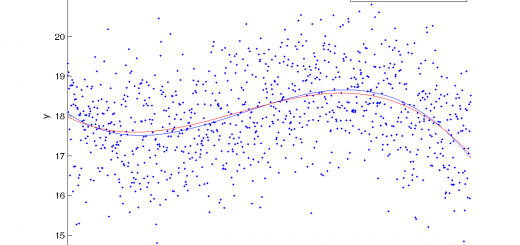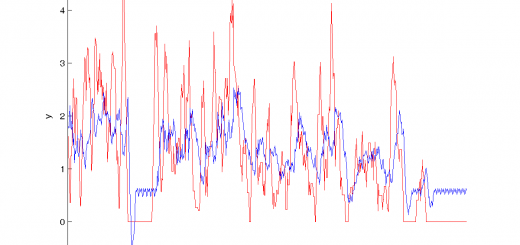Contents
Receiver Operating Characteristic example
ROC analysis provides tools to select possibly optimal models and to discard suboptimal ones independently from (and prior to specifying) the cost context or the class distribution. ROC analysis is related in a direct and natural way to cost/benefit analysis of diagnostic decision making. See http://en.wikipedia.org/wiki/Receiver_Operating_Characteristic for more information.
% demo_ROC.m
Construct the sample set
P = 100; % Number of True, P=TP+FN (True posititive + False negative) N = 100; % Number of False, N=FP+TN (True posititive + False negative) muP = -0.5;% Mean of positive sgP = 1; % Variance of positive muN = 0.5; % Mean of negative sgN = 1; % Variance of negative x=[sgP*randn(P,1)+muP; sgN*randn(N,1)+muN]; y=[ones(P,1); zeros(N,1)];
Plot the histogram
figure hold on [hP, xP]= hist(x(y==1)); % Histogram vercor for the Positive, along with the histogram values [hN, xN] = hist(x(y==0)); % The same for the Negative bar([xP',xN'],[hP',hN']); % Plot both histograms legend('Positive','Negative'); xlabel('Independent variable, x'); ylabel('Number of the objects'); title('Histograms of two classes'); axis tight hold off

Construct the ROC
nSamples = 100; % Number of samples in the threshold vecThresh = linspace(min(x), max(x), nSamples); % Vector of various thesholds ROC = []; % ROC is {(FPR, TPR)}set for t = vecThresh idxLeft = find(x<=t); idxRight = find(x>t); TP = length(find(y(idxLeft)==1)); % Number of the True positive items TN = length(find(y(idxRight)==0)); % Number of the True negative items TPR = TP/P; % Fals positive rate SPC = TN/N; % Sensitivity ROC = [ROC;[1-SPC, TPR]];% Add new element ti the ROC curve end
Plot the ROC curve
figure hold on plot([0,1],[0,1],'k:'); % Plot the random decision line plot(ROC(:,1), ROC(:,2)); % Plot the ROC itself xlabel ('False positive rate, FPR=1-SPC'); ylabel ('True positive rate, TPR'); title('Receiver Operating Characteristic') hold off



